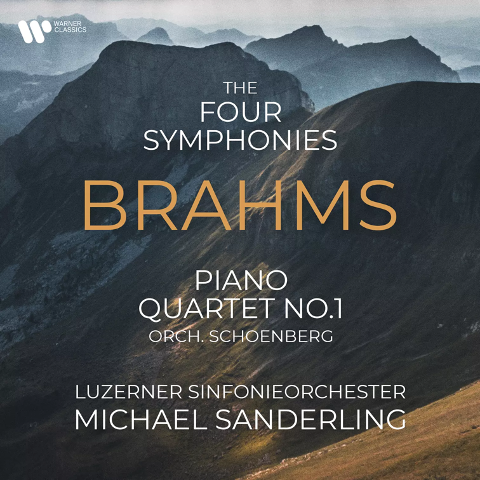BRAHMS. THE FOUR SYMPHONIES – MICHAEL SANDERLING
Brahms – The Symphonies – Michael Sanderling and the Luzerner Sinfonieorchester: A Traditional Approach with Unfulfilled Potential
Sarah Dunlop, April 2023
In this new set of Brahms symphonies by Michael Sanderling and the Luzerner Sinfonieorchester, we encounter a solidly traditional approach to the repertoire. The recordings, part of their long-term agreement with Warner Classics, present a unique opportunity for collectors seeking a fresh perspective on Brahms’ symphonic works. However, while the orchestra’s performance showcases excellence in sound and execution, it falls short in capturing the full dramatic intensity of the compositions due to an unwavering adherence to a one-size-fits-all interpretive approach.
In contrast to other recent Brahms cycles, such as Adam Fischer’s historically informed approach, Sanderling’s readings remain rooted in traditional interpretations that harken back to earlier generations of conductors. The result is a lush and sonorous sound from the Luzerner strings, evoking memories of the great Klemperer’s recordings. The woodwinds stand out with their forward balance, and the brass adds a warm and burnished quality to the performances. The inclusion of Schoenberg’s orchestration of Brahms’ first piano quartet offers a unique touch, adding an element of novelty to this cycle.
While the technical aspects of the recording are commendable, there are some shortcomings in Sanderling’s interpretive choices. His overriding focus on achieving a beautiful sound and a consistent approach to phrasing and articulation results in performances that lack dynamic contrast and expressive depth. The music often feels rounded and lacks the sharpness and emotional intensity required to fully convey the dramatic power of Brahms’ symphonies.
The absence of awareness of changing interpretive ideas over the past several decades also hampers the performances. While historically informed practice may not be everyone’s preference, a more nuanced and varied approach would have added a greater sense of authenticity and emotional engagement to the music.
Michael Sanderling and the Luzerner Sinfonieorchester’s Brahms symphony cycle on Warner Classics offers a traditional perspective on these monumental works. The orchestra’s lush sound and excellent execution make for an enjoyable listening experience, particularly for those who prefer a historically uninformed approach. However, the lack of dynamic contrast, emotional intensity, and varied interpretation may leave some listeners wanting more depth and authenticity in their Brahms experience. Collectors seeking new insights into Brahms’ symphonies may find this recording falls short of fully capturing the dramatic and emotional richness of these timeless compositions.

